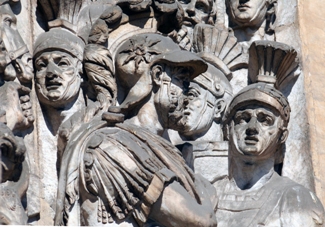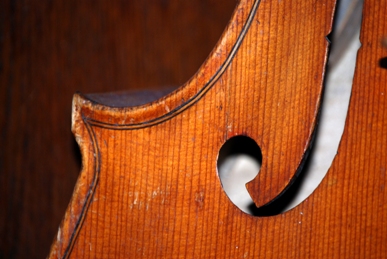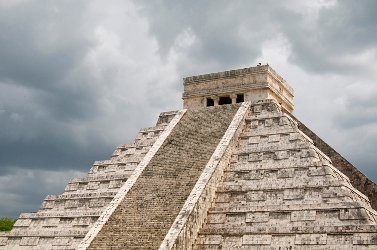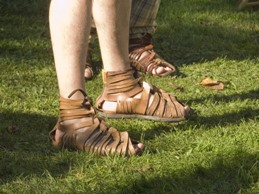Word of the Week - Archive page 2
Use the links below to navigate to the previous words of the week....
Words found on this page:
-
Valetudinarianism
Lionise
Decimate
Purfling
Parolee
Ziggurat
Eurhythmy
Sequester
Buskin
Erk
Pixilated
Valetudinarianism

This week's word is valetudinarianism. Valetudinarians are people who are sickly or weak and constantly concerned with their own health. Hypochondriacs who are also anxious about their health may be described as valetudinarian. Valetudinarianism is a weak or infirm state that is due to invalidism.
The word appeared in the 18th century and comes from the Latin valetudo, meaning state of health.
Quotes containing this weeks word:
“She affected to be spunky about her ailments and afflictions, but she was in
fact an utterly self-centered valetudinarian
(Louis Auchincloss - American author)
"There were the little sorrows of the dumb animals too--of the white
angora, with a dark tail like an ermine's, and a face like a flower, who fell into a lingering sickness, and became quite
delicately human in its valetudinarianism, and came to have a hundred
different expressions of voice--how it grew worse and worse, till it began to feel the light too much for it, and at last, after one wild
morning of pain, the little soul flickered away from the body, quite worn to death already, and now but feebly retaining it."
excerpt from "The Child in the House" * Miscellaneous Studies: A Series of Essays
Walter Horatio Pater London: 1910. (The Library Edition.)
* THE CHILD IN THE HOUSE. Appeared in Macmillan's Magazine in August, 1878, under the heading, "Imaginary Portrait. The Child in the House." Reprinted 1895 in Miscellaneous Studies.
back to top
Lionise
This weeks word it means to assign great social importance to, to look on or treat (a person) as a celebrity. For example:
"The film director was celebrated all over Hollywood"
"The tenor was lionized in Vienna"
We chose this week's word as a synonym of 'celebrate' since Alan, Clare and Heather all have their birthdays this week, and Anne-Marie has passed her viva!
back to top
Decimate
meaning:
- To destroy or kill a large part of (a group)
- Usage Problem a. To inflict great destruction or damage on: The fawns decimated my rose bushes. b. To reduce markedly in amount: a profligate heir who decimated his trust fund
- To select by lot and kill one in every ten of.
This week's word is the cause of some debate amongst scholars, because it is virtually never used for its origin meaning (number 3 above). Etymologists (that's word origin scholars, not people who study insects!) trace this word back to 1600, and it refers to a form of punishment used in Roman times.
The following exert from Maven's Word of the Day at randomhouse.com explains this in more detail:
 "The Latin word decimare means 'to select by lot and kill every tenth person of', and refers to the method of discipline the Romans
used to keep rebellious military units in line. The other nine-tenths of them, at least. It derives eventually from decem 'ten'. The
earliest sense of decimate in English, found about 1600, is a historical reference to this Roman practice.
"The Latin word decimare means 'to select by lot and kill every tenth person of', and refers to the method of discipline the Romans
used to keep rebellious military units in line. The other nine-tenths of them, at least. It derives eventually from decem 'ten'. The
earliest sense of decimate in English, found about 1600, is a historical reference to this Roman practice.
The next sense was 'to exact a tithe of one-tenth from', and applies chiefly to a tax that Oliver Cromwell levied on the defeated Royalists. This sense is of historical interest only.
The only sense that's ever been common in English is the figurative 'to destroy a great number, proportion, or part of', first found in the mid seventeenth century. Despite repeated claims that this sense is erroneous, on the grounds that decimate should only refer to a destruction of one-tenth, that is how the word is used. In fact, it seems to be the only way the word is used; despite the insistence of various usage critics, a real example of decimate meaning 'to destroy one-tenth of' has never to my knowledge been found in actual running text.
As far as the English use of the word is concerned, the important aspect of the ancient Roman practice of decimation was not the proportion of people killed, but the arbitrary viciousness of the punishment. There is nothing wrong with using decimate to mean 'to destroy a great number, proportion, or part of', and there never has been."
back to top
Purfling
Purfle (noun):
- A decorative border on clothing or furniture, etc.
purfled, purfling, purfles:
- To ornament (the edge of something) with such a border.
This word originates in the 14th century from the French pourfiler (meaning to border), from Latin pro (forward) + filum (thread).
This word has particular relevance to the manufacturing of musical instruments. In this case 'purfling' is the name given to an inlay of wood placed around the borders of stringed instruments from the violin and guitar family. This inlay, which looks very decorative, is actually used to protect the instrument. During the construction of the instrument, the wood must be bent to form the curved shape. This means that at the edges the wood is at its thinnest, to allow for bending and also to give the best resonance for the string vibrations. As a consequence of this the edges of curved stringed instruments like violins, guitars, cellos etc are the weakest point and the slightest impact to the sides could irreparably damage the instrument. To strengthen the edges purfling is added by cutting a groove around the edge and inlaying wood, or sometimes plastics (in the case of cheaper acoustic guitars) to prevent the wood splitting at the edges. The purfle is pressed into the channel, firmly glued, and finally gently hammered to get a perfect fit. The overall piece can then be smoothed and polished, before going on to be made into the final instrument.
Below is an example of purfling, which can also be highly decorative and adds to the overall aesthetic appeal of the finished instrument. It takes a skilled workman to add the purfling, particularly in violins at the 'mitre' point (see below) where the purfling material must be shaped by hand into the shape shown, which is called the 'bee sting'. This is very difficult to do

The 'Bee Sting'
back to top
Parolee
meaning ~ A prisoner released before the end of his/her prison sentence provided certain conditions are met.
Parole comes from the French word for speech or word, in this context the prisoner's word of honor to fulfill stated conditions. This is similar to the Late Latin parabola (meaning speech) and the Greek parabole.
In criminal law, release from prison of a convict before the expiration of his term on condition that his activities be restricted and that he report regularly to an officer. This differs from amnesty or commutation of sentence in that the parolee is still considered to be serving their sentence, and may be returned to prison for misbehavior. The convict generally remains under sentence, and the restrictions (as of residence, occupation, type of associates) and the supervision are intended to prevent a relapse into crime. Any violation of parole may result in return to imprisonment. In some cases, a parolee may be discharged from parole before the time called for in the original sentence if it is determined that the parole restrictions are no longer necessary for the protection of society (this most frequently occurs when elderly parolees are involved).
 Parole is designed to give the prisoner a chance to readjust and to expedite the process of rehabilitation. In military law, a parole is the promise by a prisoner of war on being released from confinement that he will remain in a stipulated place, not attempt to escape, and not take up arms again in the current hostilities against the forces that captured him
Parole is designed to give the prisoner a chance to readjust and to expedite the process of rehabilitation. In military law, a parole is the promise by a prisoner of war on being released from confinement that he will remain in a stipulated place, not attempt to escape, and not take up arms again in the current hostilities against the forces that captured him
In U.S. immigration law, the term parole has special meaning. A person who does not meet the technical requirements for a visa may be allowed to enter the U.S. for humanitarian purposes. Persons who are allowed to enter the U.S. in this manner are also known as parolees. Another use related to immigration is advanced parole, in which a person who already legally resides in the U.S. needs to leave temporarily and return without a visa. This typically occurs when a person's application for a green card (permanent residency) is in process and the person must leave the U.S. for emergency or business reasons. In the wake of September 11, 2001, there has been greater scrutiny of applications for parole and advanced parole.
The information for this entry was taken from Answers.com
back to top
Ziggurat
meaning pyramidal structure with receding tiers (step like structure)
 Ziggurats were a form of temple common to the Sumerians, Babylonians and Assyrians. The earliest examples date from the end
of the third millennium BC, the latest from the 6th century BC. The
Mesopotamians built ziggurats and were a civilization that supposedly spanned from a timeline prior to the ancient Egyptians and their great pyramid monuments.
Ziggurats were a form of temple common to the Sumerians, Babylonians and Assyrians. The earliest examples date from the end
of the third millennium BC, the latest from the 6th century BC. The
Mesopotamians built ziggurats and were a civilization that supposedly spanned from a timeline prior to the ancient Egyptians and their great pyramid monuments.
The ziggurat was a pyramidal structure, built in receding tiers upon a rectangular, oval, or square platform, with a shrine at the summit. The core of the ziggurat was of sun-baked bricks, and the facings were of fired bricks, often glazed in different colors, which are thought to have had cosmological significance. Access to the summit shrine was provided by a series of ramps on one side or by a continuous spiral ramp from base to summit. The number of tiers ranged from two to seven.
Notable examples are the ruins at Ur and Khorsabad in Mesopotamia. Similar structures were built by the Mayan people of Central America.
Unlike the pyramids of Egypt, where the materials needed to build the pyramids were transported to the sites, the ziggurats were built from small mud bricks that were produced locally.
There are about 25 remaining today, covering the area from southern Babylonia all the way north to Assyria. The best preserved is the ziggurat of Nanna at Ur (today Iraq), while the largest is found at Chonga Zanbil in Elam (today Iran). The latter of these is believed to have been nearly 50 metres high, but only half of that height remains today
There is a large amount of documentation of the ziggurat that existed in the time of Nebuchadnezzar II (605-562 BC) who deported the Jews. This was a ziggurat already old by the time of his reign and could have been the same as the ziggurat that existed in the reign of Hammurapi. Its Babylonian name was "Etemenanki" (see below) which means in English "House of the platform of Heaven and Earth". Tablets from the time documented the height of this great ziggurat at somewhere close to 300ft in height.
This temple is often associated with the famous Tower of Babel which men built to rival God. Indeed so it must have seemed to an Israelite observer whose cities were often no more than the size of our villages. They would be confronted first with the size of the city, which encompassed, at that time, both sides of the Euphrates. Babylon in the time of Nebuchadnezzar II was large even by our standards. In the city they would see the ziggurat, which would seem to them, usually living in single story houses, to reach almost to heaven. Many Jews would have seen it with their own eyes when they were deported to Babylon in about 600 BC. This would have no doubt reminded them of the events at the Tower of Babel.
Information for this weeks entry were taken from the following sources:
http://www.crystalinks.com/ziggurat.html
http://www.bible-history.com/babylonia/BabyloniaThe_Ziggurat.htm
back to top
Eurhythmy
the art of turning sound into physical movement
- A system of rhythmical body movements performed to a recitation of verse or prose. the interpretation in harmonious bodily movements of the rhythm of musical compositions; used to teach musical understanding[syn: eurythmy, eurythmics, eurhythmics]
- Harmony of proportion in architecture.
Sometimes referred to as "visible speech and visible song" , eurhythmy was introduced by Rudolf Steiner in 1911. The aim is to speak and sing through movements and gestures that reveal to the eye what language and music bring to the ear. The movements of the eurythmist relate to the space around and can vary from simple hand gestures to whole body movements. The elegance of the larynx is extended to whole-body movement. For this reason eurythmy is an original artistic movement discipline rather than a dance form.
Eurythmy answers the riddle, what does language and music actually look like? What our ears could previously only hear, we can now see in eurythmy. Language and music are made visible in eurythmy: as in the ear, so also in the eye. When eurythmy is at its best, we may see far more than we hear. Now we can see what the words look like, and watch an octave blossom through the medium of human gesture.
This description was taken from Eurythmy FAQ
"Now all that can be perceived by supersensible vision, all that can thus be learned about the nature of these forms and gestures of the air, can be carried into movements of the arms and hands, into movements of the whole human being. There then arises in visible form the actual counterpart of speech. One can use the entire human body in such a way that it really carries out those movements which are otherwise carried out by the organs connected with speech and music. Thus there arises visible speech, visible music - in other words, the art of Eurythmy." Rudolf Steiner
Origins of the word:
Eurhythmy comes from the latin eurythmia and from the Greek euruthmi, from euruthmos meaning rhythmic, well-proportioned .
back to top
Sequester
sequestered, sequestering, sequesters
- To cause to withdraw into seclusion, providing privacy.
- To remove or set apart; segregate e.g. "a sequestered jury"
Legal use of the word:
- To take temporary possession of (property) as security against legal claims.
- To requisition and confiscate (enemy property).
In so-called "high-profile" criminal prosecutions (involving major crimes, events or persons given wide publicity) the jury is sometimes "sequestered" in a hotel without access to news media, the general public or their families except under supervision, in order to prevent the jury from being "tainted" by information or opinions about the trial outside of the evidence in the courtroom. A witness may be sequestered from hearing the testimony of other witnesses, commonly called being "excluded," until after he/she has testified, supposedly to prevent that witness from being influenced by other evidence or tailoring his/her testimony to fit the stories of others.
Chemistry use of the word:
- To hold (as a metallic ion) in solution usually by inclusion in an appropriate coordination complex
Origins of Sequester
Sequester was first attributed to the Old French Sequestrer in the 14th century. This word was derived from the Latin words sequestrare "to place in safekeeping," and sequester "trustee, mediator,". The Latin sequester probably originated from sequi, "to follow" which is interestingly the same word that sequel derives from. The legal meaning of sequester, i.e. "seize by authority, confiscate", is first attested 1513.
Quotes
"The love of learning, the sequestered nooks, and all the sweet serenity of books."
Henry Wadsworth Longfellow, American Poet 1807-1882
Sources for this entry's information:
dictionary.com
merriam-webster online
etymology online
back to top
Buskin
meaning laced boot/Greek tragedy
 A buskin, traditionally is a name for a thick-soled, laced boot, reaching to knee or calf. The word is perhaps derived from the Old French word brousequin or the Old Dutch brosekin 'small leather boot'. Buskins were worn by actors of ancient Greek and Roman tragedies. This association led to 'Buskin' being used as another word for a Tragedy (play)
A buskin, traditionally is a name for a thick-soled, laced boot, reaching to knee or calf. The word is perhaps derived from the Old French word brousequin or the Old Dutch brosekin 'small leather boot'. Buskins were worn by actors of ancient Greek and Roman tragedies. This association led to 'Buskin' being used as another word for a Tragedy (play)
Actors in comedies however wore a much lower, lightweight shoe called a soccusis why a comedy is sometimes referred to as a 'sock'
This can be seen in the following two quotes:
"He . . . knew all niceties of the sock and buskin"
Byron
"`My vein,' wrote Corneille, `often combines the lofty buskin with the comic sock, and ... pleases the audience by striking contrasting
notes."
Linda Winer, Corneille With Kushner's Help, Newsday (New York), Jan 20, 1994.
This weeks word is also found in this exert from 'Coole Park And Ballylee' by William Butler Yeats:
"Upon the border of that lake's a wood
Now all dry sticks under a wintry sun,
And in a copse of beeches there I stood,
For Nature's pulled her tragic buskin on
And all the rant's a mirror of my mood"
back to top
Erk
meaning Slave
This weeks word is another word for slave, flunky, or drudge. 'Erk' is thought to have originated as an abbreviation of 'aircraftman' which is the lowest rank in the British Royal Air Force. It is also used in the navy to describe a seaman (again the lowest rank available). This is British slang and was first used in the early 20th century.
back to top
Pixilated/Pixelated
also written pixillated, pixellated and pixelated
This weeks word of the week is an interesting one as it has many meanings, and many different spellings. It is probably a word you are already familiar with, although its duel meaning and origins is a surprise to most people!
According to Dictionary.com (who cite Webster's New Millennium™ Dictionary of English as their reference for this) Pixelated (and the various other spellings of the word given above) has two meanings:
- pertaining to a printed image which has been digitized; visible as a pattern of pixels; also written pixellated.
- bewildered, confused; slightly insane.
The second meaning (more often associated with the pixilated spelling) has its origins in the word 'pixie' meaning mischievous fairy or elf-like creature. In legend these creatures were said to abduct the unwary and drive them to madness, which is why insane people can be described as being 'away with the fairies'.
Pixilated is a jocular word from New England (USA), where it was probably a variation of the Cornish phrase 'pixie-led' (i.e. to be taken away by the pixies). The earliest use I could find of the word 'pixilated' was a quote from the campaign song of Zachary Taylor in 1848 which is sung to the tune of 'Yankee Doodle and contains the lyric, "You'll never find on any trip that he'll be pixilated". Meaning the he was a sober and upstanding candidate. The word came into common usage in 1936 after it was featured in the film "Mr. Deeds goes to town", in the film two elderly women are using the word to describe their neighbors.
In the early 1900s American theatre producers came up with a technique of using lights to create the illusion of actors being portrayed in a type of animation. From this came the technique of using a stop frame camera to distort the movement of actors. They called it pixilation. It was adopted as a photography term and in the 1980's became associated with the more commonly know definition in digital imaging.
So if you find yourself driven to madness by digital image processing, you are perhaps experiencing pixilation in the original meaning of the word!
back to top
Just for fun
A little peek into the lighter side of life within the Heriot-Watt Waves & Fields group.
Word of the Week:
Gallivanting
Or: